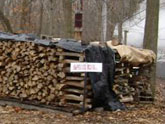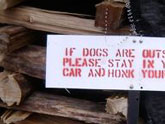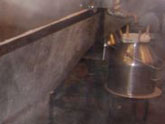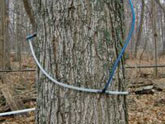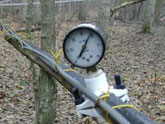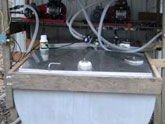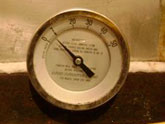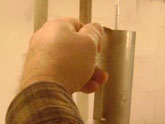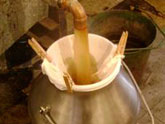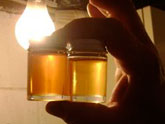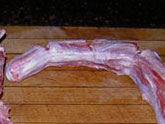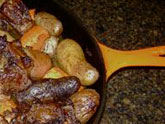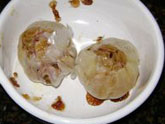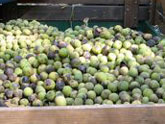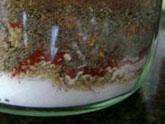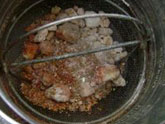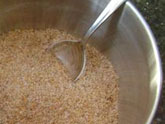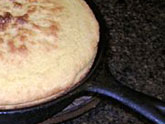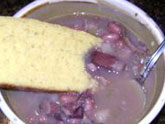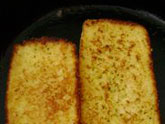February 26, 2009
Sugar camp
When he's got the evaporator fired up, a cloud of condensation dissolves into a gray Ohio sky soon after it leaves Glenn Lowe's sugar shack, and doesn't reveal the location until you're right up on it. It's flat country around Ostrander, but Glenn's sugar camp, dug into the East bank of the Scioto River north of nearby Warrensburg, conjures a scene of thin smoke curling up from some Tennessee holler.
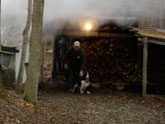 |
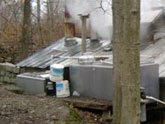 |
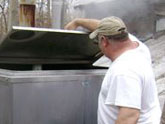 |
Glenn in the company of two mean dogs works the camp by himself. He cuts the wood and stores it, hauls it to site, maintains the hoses, the considerable gear and the equipment, runs the evaporator, bottles the syrup, cleans up after himself, and peddles the finished product. Thoreau writes, "Every man should be his own butcher, cook and scullion." That's Glenn.
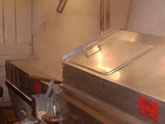 |
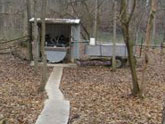 |
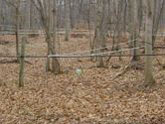 |
I've known him almost since we moved here 40 years ago, have hunted and fished with him, and spent an evening or two with him when he bought his first evaporator so long ago we can't remember the year. He's old school, like a few more of my local friends, and he takes pride in the old ways.
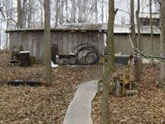 |
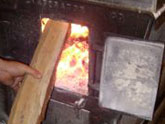 |
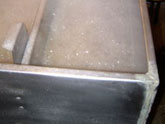 |
Glenn's family butchers hogs every winter. I asked him if they still scalded and scraped, as they did the first winter when I joined them in an event that was to become a family ritual, or if they'd since gone expedient and skinned, like everyone else. "We did 11 this winter, and we scraped them, just like Dad said we should."
Sap water is running high in sugar right now, at 2+ on his meter. When it is, and when you get the syrup off the first evaporation, before it's boiled too long, you get the primo stuff, light amber in color and delicate in flavor. I went up today while the selection was good and brought home 6 quarts.
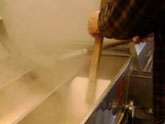 |
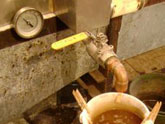 |
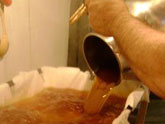 |
Glenn started out tapping trees and hanging buckets. He's got gravity hoses connecting his trees now, and they feed into a 300 gallon collecting tank. From there the water is pumped to a 400 gallon holding tank right above camp, and from there it flows into a 3' by 12' evaporator that can handle 100 gallons of water per hour, twice the capacity of his old evaporator. During the most intense part of a long day yesterday, spanning 8 continuous hours of feeding the firebox and tending the troughs, with the sugar content running around 48 to 1, Glenn reduced almost 900 gallons of water to arrive at 18 gallons of maple syrup.
February 23, 2009
From the E-Mail Bag: Jan Adkins on Oscar
Dean:
I was invited to watch the Oscars with our cinema club. I believe I would pay good money to avoid it.
The Oscar Show is analogous to Depression-era folks watching Fred & Ginger in tuxedo and gown as they dance through an unreachable (unbelievable, non-existent) upper crust Art-Deco world through the smoke of a thousand cigarettes and the fumes of gin and champagne.
Something I never thought of until now is the cynical way we – or rather our parents, the Depression audience – were asked to pity poor little rich girl Kat Hepburn in Philadelphia Story. The poor dear. She's going to marry that silly coal baron guy from a (gasp) working-class background even though she obviously doesn't love him, doesn't care much for him at all, and he's obviously so . . . BELOW her. How happy we are when she casually jilts the nouveau riche creep and marries slightly Bohemian yacht-designer (not a tradesman, shudder) Dexter-Haven. And poor Jimmy Stewart! He winds up with the smart-ass consolation prize, the working girl. Damn, just missed.
Let's rewrite Philadelphia Story as the Bayonne Story, in which the philandering father is brought up on charges of pederasty, the mother is shipped off to rehab, the FBI closes in on the Dexter-Haven mansion to ransack the place with a federal warrant, Hepburn is discovered in the cabana with two Hispanic poolboys and the Slovakian maid, the precocious younger sister is sold to a Saudi sheikh to save the family investments, and the servants finally demand their wages. Jimmy Stewart and the camera girl have a working class beer with the coal baron and the three of them walk happily into the sunset, realizing that they've been spared a life of melodramatic angst. Stewart and Nikon leave journalism for honest employment and buy a taco-trailer, which they park outside the only working factory in Philadelphia (manufacturing land mines), selling fast food over the counter, steroids and marijuana under the counter. G-major chord, happy ending.
I Love Lucy makes enormously more sense than the Oscars.
February 21, 2009
braised Oxtail
A piece of meat from anywhere along the loin of a large animal arrives at the dinner plate through a quick, stumble-proof process, but the really flavorful parts of an animal, from the extremities, yield their rewards only through patient cooking and imagination.
We had two oxtails. Mary browned and braised one two weeks ago and served it with large flat egg noodles. Memories of that goodness have plotted against the second package since then.
I did mine backwards from Mary. She browned her pieces in a hot oven first, then added broth, covered them, and braised them in a low oven until they were tender. I skillet-browned mine, deglazed with red wine and added beef broth.
After I'd covered them and placed them in a 325º F oven with a large chopped onion and garlic, I consulted by phone with Chief Dan Hugelier, a certified Master Chef, and my cooking, bow-building, bow-hunting and hang-out companion.
"Chief, should I have browned the meat first, before braising it?"
"Dean, you can back into a parking place, or you can pull in head first. Either way works."
"Ok, I went in headlong. You got recommendations? I thawed the pkg this morning and jumped into it without a destination. Maybe a marinara sauce and some linguine? Oxtail soup? What?"
"Dean, why are you asking me? You can cook. Do whatever you think."
"Chief, that's why I'm calling you. I wasn't thinking."
"Root vegetables, Dean. The future lies in root vegetables."
When the meat began yielding to a fork, after almost two hours, I added fingerling potatoes to the onions and garlic (three varieties: white, red and purple), carrots chunked to a similar size, and a parsnip. Had there been more room under the lid, I would have added some baby portabellas.
After the vegetables softened, I removed the skillet, turned the oven up to 475º, basted the meat and vegetables while the oven rose, then reintroduced the unlidded skillet until the contents carmelized. About 12 minutes.
I love the gelatinous goodness of oxtail, and would eat more at one sitting if my fingers didn't glue together like a spatula. Loss of dexterity is nature's way of making me stop. Think I'll slice the remaining vegetables over the leftover bones and meat, peel and mash into the broth two bulbs of garlic that we roasted during the braise (we ate a third one), sprinkle on some green peas, and simmer everything into a hearty soup for tomorrow's lunch.
Good food sustains you during its creation, by its consumption, and through its memory.
February 19, 2009
Gather ye walnuts and fiddle away
I've only ever attempted two film clips. The first, from last Sunday when our family gathered here in Ostrander to celebrate Mary's birthday, shows our granddaughter Eliza fiddling "Turkey in the Straw". It was a raucous good time around the kitchen and food.
The other, from Autumn, 2006, demonstrates my method for picking up walnuts. I wasted the better part the day learning how to import and edit this film, got aggravated and decided to take someone else down with me. So I posted it here.
February 18, 2009
From the e-mail bag
Re: Tell Me Now
So it's rock and roll and Dean Martin and Rogers & Hart & Hammerstein, and no doubt Chopin and Beethoven—they're all thinking the same thing (birds do it, bees do it....). My kids, as far as I can tell, are blissfully unaware just like I was. Do you remember I sang "I'm just a girl who can't say no" in a talent show in h.s.? I really didn't know what I was singing about or I'm sure I would have died of embarrassment.
—Rebekah Cotton, eldest daughter
Bekah, you were beautiful and innocent, and you belted that song outta the park. —Dad
I was as dumb as the rest about what was going on back then with the music, … hoodwinked … into bringing up those feelings without actually saying the words. Kind of like instrumental jazz, in which everyone plays around the melody without actually going there. I wouldn't trade the experience for anything.
—Don Stokes
February 17, 2009
Tell Me Now
I played "In the Still of the Night" on YouTube last night, and it called up a dim question I've had rattling around, so I called Mary in to hear a few oldies. She barely remembered any of them. "That's nice," she'd say as we scrolled through linked songs. But when she saw Eydie Gorme's name flash by, she stopped me and we listened a bit.
Mary grew up playing the piano and the trumpet. Her taste in music went elsewhere than mine, to classical stuff, and to jazz and Broadway musicals. That music affected her as profoundly as any song by the Five Satins moved me, and rock 'n roll covered the spectrum of my life, from "Yackety-Yack" yucks to "Mr. Blue" bathos.
So how could I have missed rock's 50's connection to sex until I was a grown man looking back? Honest. I did. I met my thrill on Blueberry Hill? Likely stole a kiss during a family trip to West Virginia. Why do fools fall in love? A 13 year old barely pubescent Frankie Lymons almost my age wrote and sang that song. Mary never drew a sexual inference from any rock 'n roll lyric she heard either, but she wasn't much of a witness. Traditional pop music maintained a parallel world of double meaning. She imagined chilly temperatures rather than unfolding seduction as Dean Martin sang "Baby It's Cold Outside."
Now that I have our parents' eyes and ears, I know what they thought about rock 'n roll. They saw dance gyrations as tribal; I saw them as something I was too clumsy and self-conscious to attempt. Grownups gulped when the Shirelles shimmered against a background of swelling violins:
Tonight you're mine completely.
You give your love so sweetly.
Tonight the light of love is in your eyes,
But will you love me tomorrow?
Couldn't get much more explicit than that. But you know what? It blew by me. I was as fickle as any teenager. I'd have a crush on a girl one day and try to avoid her look the next. That's how I heard the song, and that's how I practiced "love 'em and leave 'em." It never occurred to me that a lyric would carry sexual allusions and suggestions because sex was a personal secret. I didn't understand that the music was telling me the world knew my secret.
How did you hear these songs? As superficially as I did, or were you aware of the implications? I remember a high school buddy commenting with a wry smile on "great balls of fire." My head spun around, and I wondered, "What the hell? Where'd that come from?" I shook myself and went back to skating on the surface.
Where were you, children of early rock? On the surface, or under cover? I'm guessing you've entertained a similar curiosity about old friends, too, and now worry for your grandchildren, which like mine recently became teenagers in an unbuffered, explicit world. Were you blithe witnesses with starry eyes, or conspirators with coded information? Did Ed Sullivan's refusal to show Elvis below the waist hide what you wouldn't have understood, or what you already knew? Can our grandchildren, barraged from every direction, not know now what we didn't know then? When the Shirelles sang "So tell me now, and I won't ask again," where were you?
February 10, 2009
Roasting 'Possum
I passed a chance at a 'possum tonight and don't know if I'll get a better one anytime soon. He was waddling across the driveway when we pulled up to the mailbox. All I had to do was grab him.
It occurred to me a week ago to catch one, should the opportunity arise, butcher it, pose it up suckling piglet style with an apple in its mouth to obscure its carnivore's teeth, and photograph it for these pages. That along with a 'possum purging diet of oatmeal and milk, butchering instructions, and a roasting schedule. I thought I might even scald and scrape him the old-fashioned way, in140º water, and then cross-hatch the skin to facilitate rendering the large layer of fat that typically surrounds one. Presentation.
To add verisimilitude, I figured to stuff his belly with prunes, claiming they were dried persimmons, and crowd peeled yams around his sides. I'd suggest seasonings for this made-up recipe, too, and pretend that I relished the dish and fixed it regularly.
Having worked harder for cheaper laughs in the past, I wouldn't throw him out raw. Figured I'd photograph the varmint roasted, garnished with parsley and lemon slices, further disguising the deception by cloaking it with the authenticity of the squirrel and shank recipes. The more I added ingredients and details, the more amusing the set-up became.
But tonight, returned from grocery shopping, sitting in the truck with the engine idling, watching an unhurried 'possum while Mary retrieved the mail, it occurred to me that my effort and curiosity would obligate me to a bite. Suppose I cooked him up and found his yam-infused haunch not only palatable, but desirable? Suppose I came to prize his candied skin as much as any bronze-roasted piglet's. Suppose my life took a turn in the direction of 'possums and persimmons? At this late stage, could I afford another passion? Could I find the energy for the steep ascent of a new learning curve? And wouldn't that be just the path I'd expect Irony to take, doubling back and tripping the Trickster?
I let him waddle. Mary climbed into the truck and I turned down the driveway. That's when the second guesses began crowding in. Wasn't the recipe based upon sound principles? What's the likelihood of growing an affinity for 'possum flesh against the memories of 'possums afield grinning from rib cages? Could purging one for a week or two actually rid me of those? Suppose it happens that folks come to need a 'possum recipe, and all they've been fed is a ruse? Where's the joke in that? It's likely to happen, too, because ain't that the way the world really works?
I've got my eye out for a 'possum.
February 5, 2009
PUlled pork
Besides being cheaper than boneless (98 cents a pound for these), bone-in pork butts make better pulled pork. The bone imparts flavor to the meat as it cooks, the meat holds more juices through the cook, and the bone acts as a "done" indicator when it slides cleanly from the meat.
Good bark, good smoke ring. If you've blended up a tasty, carmelizing rub, and sauce it the way you like, bbq requires no more than beer in hand and grease on chin.
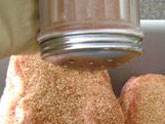 |
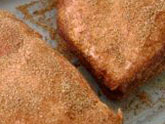 |
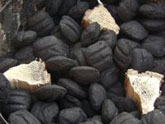 |
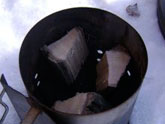 |
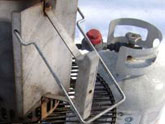 |
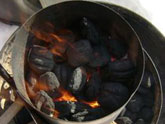 |
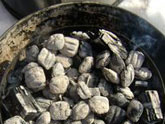 |
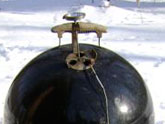 |
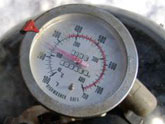 |
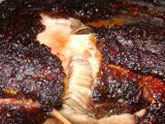 |
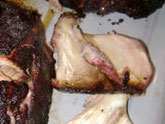 |
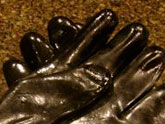 |
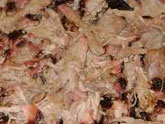 |
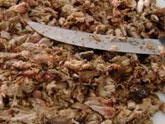 |
February 5, 2009
What Rough Beast Slouches
Started pork butts over charcoal and hickory yesterday morning. Evening temps fell as low as 2º, and the schedule went awry. They are nearing completion now, requiring almost an additional 8 hours of cook, but they look and smell spectacular. It has to be low and slow for a long time over the right kind of heat, or it ain't my kind of bbq, and I'm willing to pay the price in time and energy.
While the cook continues into the wee hours, I've been thinking about a letter my friend Jan Adkins sent to me yesterday. Here's an excerpt:
The research I'm doing on oil – and you know I'm a careful ferret – reveals far more serious problems than we're asked to believe. Since you and I plan to live another thirty years, we'll see a major change in the culture of this country and perhaps the West in general. Hard times coming and little doubt: political upheaval, population glut, a new paradigm forced upon us by fifty years of whoopee energy use. The most shocking thing is that we've painted ourselves into a suburban corner: we need a car and cheap gas to buy groceries, go to school, go to work, everything. We trashed the city, a machine for dense creativity with neighborhood containing widely differentiated life. What we have now are bedroom colonies with roughly the same strata of workers separated from all services by superhighways. Our grandchildren will be faced with famine, serious struggles for food and potable water, medicine, and raw materials. Except they're not learning the skills they'll need. See to it, brother. Teach your grandkids, male and female, carpentry and plumbing and electric and mechanical skills. In a very few years we may be going locavore.
Jan's assessment is likely accurate. He is a careful ferret, and a thoughtful man with no agenda beyond the love of knowledge and understanding, no goal beyond reporting his results. I don't know what the future holds, but it likely mirrors our past and therefore comes laced with doomsday prophets, false messiahs, and segments of civilization in upheaval as a result of something within the human psyche that marries readily to Armageddon. Something leads a few of us into the Messiah complex, and something attracts others of us to follow them. In the secular world, the same dynamic works through cult of personality and celebrity worship.
Did you know that there were a number of prophets immediately preceding and following Jesus who also claimed to be Messiah, and had their following? That there still are adherents comprising large followings, some with sects numbering hundreds of thousands belonging to the more famous of the false prophets, such as Shabbatai Zevi? And that in various manifestations they've kept us company through 2000 years? What brands them "false" is history's retrospective eye--they came to bad ends, ends they might have otherwise preferred, ends similar to Shabbatai's.
Passing through Turkey during his Final Tour of Europe in the mid 1600's, while enroute to Jerusalem to bring the world to an end, with huge segments of societies poised for it, and followers in many nations within Europe, Asia and Africa preparing for it by unroofing their houses and giving away wealth and property, Shabbatai was captured in Constantinople, and given the choice of embracing Islam or a swift beheading. He chose to recant, and worked the saracen side of the altar until his uneventful death.
It seems we periodically curl our toes over the edge and look into the abyss. We get dizzy, shed blood into it, swear off the view, retreat cleansed to some peace and commerce, but then slowly inch our way back again for another look. It's the way we roll. We have a larger, more secular world now, but one just as full of ignorance and superstition, and it includes in its numbers not only the Jim Jones types and other religious whackos, but also Mayan calendar prophesies, numerologists, astrologers, New Age avatars, seers, ufologists, and various and assorted other goofballs, grotesques, and acolytes, unified in their fear and trembling, and as focused on their view as any ignorant mendicant who ever gave away his goats and tore off his roof.
We are collectively inching toward the precipice again. Whether it's reality or perception that brings us there, whether it's depleted oil supplies, a collapsed world economy, a torn ecostructure, the Apocalypse, or a spaceship hiding behind the comet Hale-Bopp, we are likely to get a whole lot closer before we return to tranquility. This means you and I as well as those who are mission bound, because we're all getting dragged along together.
In short, there's little doubt in my mind that Jan's forecast for dire times is accurate. Mainstream think tank economists, orthodox political pundits, ecologists, survivalists, anarchists, visionaries and desk clerks, all feel the same chill in the air. For myself and mine, I know how to chop wood, skin a coon, gut a deer, preserve vegetables and meat, sharpen a handsaw, shoot a gun, make a bow and arrow, run a trot line, and more. Much more. Not because I foresaw any of this and began preparing, but simply because I've always been attracted to life close to the bone for its own rewards and worth, to the elemental with its curtains and seductive trappings pulled aside. I don't have barrels of flour in the basement, but I do know a little about living small and the taste of marrow.
If, as the poet Yeats wrote, "the center will not hold," if the thermostat indeed quits working and the lights go out, whip you up a batch of squirrel stew. It's really quite good. Cultivate your garden, and don't worry. The young'uns are resourceful and some of them will survive.
Then again, we may yet step back with little damage. So? So maybe Mary and I will find salvage in what was once a comforting portfolio of stocks and bonds. Maybe we won't require a hand-operated pump for our shallow well. Regardless, I'll still be going to Arkansas this month to squirrel hunt, and South Carolina in March to replenish our feral hog supply, catch fish and help a friend impale an alligator. Beyond that, it's approaching time to lay 2010's store of firewood behind next winter's, plan a Spring garden, and prepare for a new batch of broiler chicks while I wait for hunting season next fall. Right now, it's time to pull some pork.
February 2, 2009
Black Magic
We have a trained cast iron skillet that came to us through Mary's mother. It's been family employed for at least 75 years, and likely came to her through her mother. It's so proficient baking buttermilk cornbread that Mary only needs to assemble the ingredients on the counter top and set the oven for 450º F.
After we've eaten our fill and refrigerated the balance, it browns the remaining slices, which serve up fine for breakfast with butter and maple syrup.


